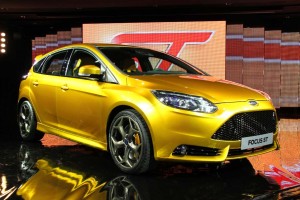Ford is planning to introduce an array of 20 new or significantly freshened vehicles in Europe over the next three years and will use existing plants in Spain, Germany, Romania and Turkey to carry out the plan.
The program is designed to help Ford turn things around after a devastating downturn worsened by the 2009 economic crisis.
“We’ve come through the worst of the economic crisis as a strong and profitable company, and we have a full pipeline of exciting vehicles coming to market,” said Stephen Odell, chairman and CEO, Ford of Europe, “Now we are taking the right actions to grow profitably in Europe.”
With the automaker pressing ever further with its One Ford strategy, however, the plans for Europe will be felt around the world, notably in the United States, where next-generation models, such as the Fiesta and Ford also will be introduced. The changes coming in Europe, meanwhile, are designed to support CEO Alan Mulally’s plans to grow global sales by more than 50%.
(For more on that story, Click Here.)
Under the program, Ford’s assembly plants in Valencia, Spain, and Saarlouis, Germany, will be dedicated to manufacturing C-segment vehicles, while Ford’s operations in Cologne, Germany and Craiova, Romania, will build B-segment vehicles and small fuel-efficient EcoBoost engines.
Next-generation Ford Transit Connect and Ford Kuga planned will be built in Valencia, Spain, while the Ford plant in Saarlouis, Germany, which recently started production of the all-new Ford Focus, will build the Focus Electric from 2012.
“The product sourcing actions – together with our existing sourcing plans for our other European plants – will enable us make the best use of our total production capacity, and provides us with a solid base from which to grow our production volumes in the years ahead,” Odell said.
In the future, the Saarlouis plant also has been assigned the next-generation Ford Focus, which follows the current model. The Ford plant in Cologne, Germany will build a freshened version of the Ford Fiesta that goes into production next year, as well as the next-generation of the Fiesta, which follows the current model in the future. Ford’s Cologne engine plant will begin producing the new fuel-efficient 1-liter EcoBoost engine later this year.
Ford’s plant in Craiova, Romania, will build the all-new Ford B-MAX from early 2012 and also will manufacture a second B-segment vehicle in the future. The plant also will begin producing the new fuel-efficient 1-litre EcoBoost engine in early 2012
Otosan plant in Kocaeli, Turkey, will build an all-new light commercial vehicle in addition to the next-generation Transit commercial vehicle.
Overall, the moves are expected to increase Ford’s manufacturing productivity and retain flexibility as the company prepares to launch new vehicles in the next three years, Ford officials said.
“We are making very efficient investment decisions that position us to leverage improved capacity utilization, greater component and supplier synergies, and increase our productivity, while retaining a high level of flexibility to quickly meet customer demands,” said Ken MacFarlane, vice president, Manufacturing, Ford of Europe.
Last week, Ford and Sollers, Russia’s second-largest producer of passenger cars and light commercial vehicles, confirmed in Moscow that they will establish a joint venture, Ford Sollers, to manufacture and sell Ford vehicles in the heart of the former Soviet Union.
The joint venture is key to Ford of Europe’s overall growth strategy as it will enable Ford to deliver more vehicles and enhanced service to customers in Russia, which is set to become Europe’s largest vehicle market by mid-decade, Ford officials said.

